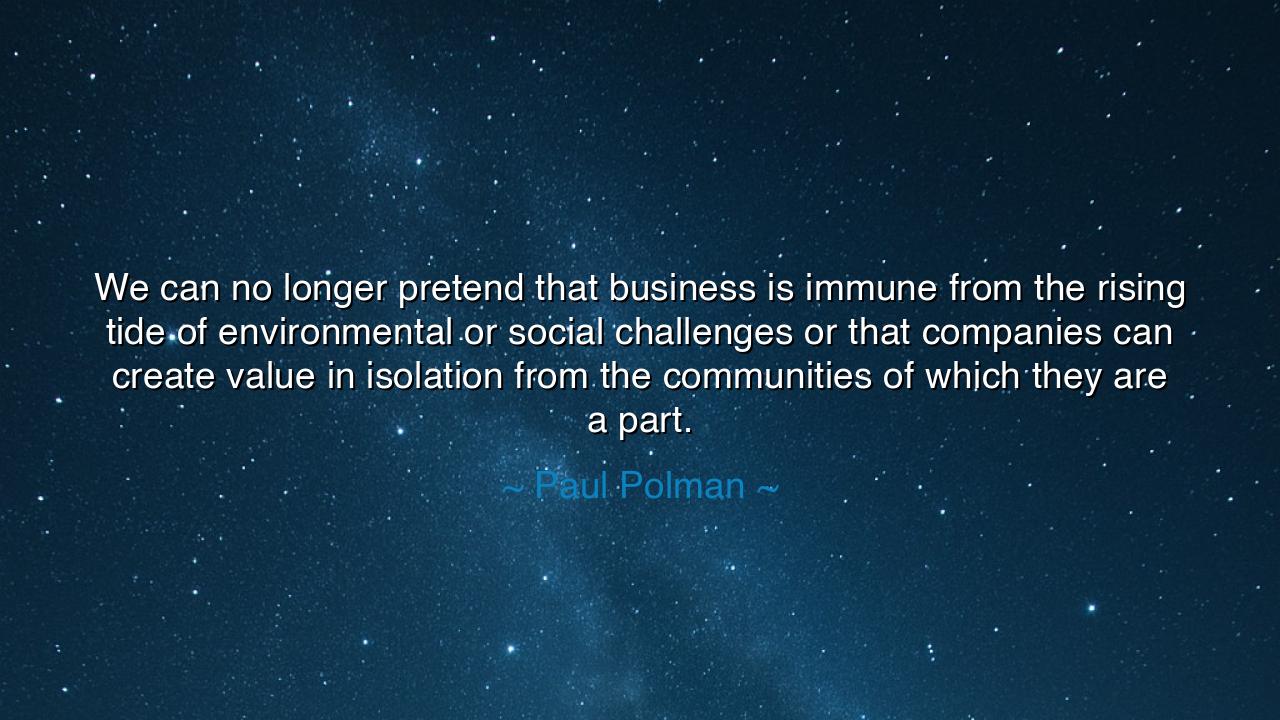
We can no longer pretend that business is immune from the rising
We can no longer pretend that business is immune from the rising tide of environmental or social challenges or that companies can create value in isolation from the communities of which they are a part.






In the voice of wisdom and foresight, Paul Polman spoke words that resonate like a moral compass for our age: “We can no longer pretend that business is immune from the rising tide of environmental or social challenges or that companies can create value in isolation from the communities of which they are a part.” These words carry not merely the tone of a business leader but of a sage, one who sees the truth that commerce and conscience, economy and ecology, are threads of the same cloth. They remind us that no enterprise, however vast or powerful, can stand apart from the world that sustains it.
Polman’s insight was born from his own journey. As the former CEO of Unilever, he sought to transform one of the world’s largest corporations into a force for sustainable growth. In an era when quarterly profits ruled with iron fists, he dared to speak of long-term purpose. He saw clearly what many ignored: that environmental degradation, social inequality, and corporate greed were not external forces to be managed, but reflections of a broken relationship between business and society. In this sense, his quote arises not from abstraction, but from lived leadership—a call born in the crucible of real-world responsibility.
The “rising tide” he speaks of is both literal and symbolic. The seas swell under the heat of climate change; the air grows thick with pollution; the forests recede under relentless expansion. But the tide also rises in the hearts of people—citizens, workers, and consumers—who demand justice, transparency, and care. Businesses once saw these concerns as distractions from growth; now they are the measure of survival itself. For as Polman declares, no company can create value in isolation. The health of a business is bound to the health of its community, its environment, and its people.
History provides many examples of this truth. Consider the tragedy of Bhopal, India, in 1984, when a gas leak from a pesticide plant killed thousands and poisoned generations. The company responsible sought profit without accountability, and the cost was devastation. Contrast this with the story of Patagonia, the clothing company that built its brand not by exploiting nature but by protecting it—repairing gear, reducing waste, and urging consumers to buy less. The former ignored the bond between commerce and creation; the latter honored it. The results speak across decades.
Polman’s message echoes the wisdom of the ancients: that prosperity must be rooted in harmony. The Greeks called this Eudaimonia—a flourishing life that balances material success with moral virtue. The Chinese spoke of Dao, the Way that unites heaven, earth, and humanity. So too does Polman remind us that modern capitalism must return to balance. A company that poisons rivers cannot thrive long; a market that ignores suffering cannot endure. The environmental and social challenges of our time are not obstacles to profit—they are the mirrors of our ethical maturity.
The lesson is clear: in the new age, profit and purpose must walk together. Let business leaders remember that every product draws from the earth, every worker draws from society, and every company draws from the trust of people. To betray these sources is to undermine one’s own foundation. The wise enterprise seeks not domination, but cooperation; not exploitation, but regeneration. It measures success not by what it extracts, but by what it gives back.
For individuals, too, the teaching is the same. Whether we are entrepreneurs, consumers, or citizens, we hold a share in the destiny of the world. Support companies that honor sustainability. Speak truth to those that do not. Live as though your daily choices echo into the lives of others—because they do.
Thus, Paul Polman’s words are not merely an economic observation; they are a moral commandment for the age of climate and conscience. “We can no longer pretend,” he warns, for the time of denial has passed. The world is interwoven. The air we breathe, the water we drink, the labor that sustains us—all are one. To build a just and lasting prosperity, we must awaken to this truth: that the wealth of the few cannot come at the ruin of the many, and that the future of business lies not in isolation, but in communion with life itself.






AAdministratorAdministrator
Welcome, honored guests. Please leave a comment, we will respond soon